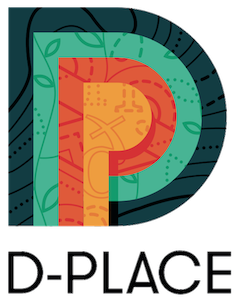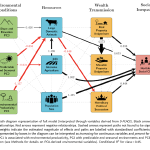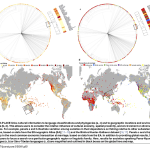Project: D-PLACE: Database of Places, Language, Culture and Environment

From the foods we eat, to who we can marry, to the types of games we teach our children, the diversity of cultural practices in the world is astounding. Yet, our ability to visualize and understand this diversity is often limited by the ways it traditionally has been documented and shared: on a culture-by-culture basis, in locally-told stories or difficult-to-access books and articles. D-PLACE represents an attempt to bring together this dispersed corpus of information.
Publications from this Project:
Pathways to social inequality..

Haynie H, Kavanagh PH, Jordan FM, Ember CR, Gray RD, Greenhill SJ, Kirby KR, Kushnick G, Low BS, Tuff T, Vilela B, Botero C, & Gavin MC. 2021. Pathways to social inequality. Evolutionary Human Sciences, 3, E35.
Social inequality is ubiquitous in contemporary human societies, and has deleterious social and ecological impacts. However, the factors that shape the emergence and maintenance of inequality remain widely debated. Here we conduct a global analysis of pathways to inequality by comparing 408 non-industrial societies in the anthropological record (described largely between 1860 and 1960) that vary in degree of inequality. We apply structural equation modelling to open-access environmental and ethnographic data and explore two alternative models varying in the links among factors proposed by …
Abstract PDF 10.1017/ehs.2021.32D-PLACE: A Global Database of Cultural, Linguistic and Environmental Diversity.

Kirby KR, Gray RD, Greenhill SJ, Jordan FM, Gomes-Ng S, Bibiko H-J, Blasi D, Botero CA, Bowern C, Ember CR, Leehr D, Low BS, McCarter J, Divale W, Gavin MC. 2016. D-PLACE: A Global Database of Cultural, Linguistic and Environmental Diversity. PLoS ONE 11(7): e0158391.
From the foods we eat and the houses we construct, to our religious practices and political organization, to who we can marry and the types of games we teach our children, the diversity of cultural practices in the world is astounding. Yet, our ability to visualize and understand this diversity is limited by the ways it has been documented and shared: on a culture-by-culture basis, in locally-told stories or difficult-to-access repositories. In this paper we introduce D-PLACE, the Database of Places, Language, Culture, and Environment. This expandable and open-access database (accessible at …
Abstract PDF 10.1371/journal.pone.0158391 Code Website